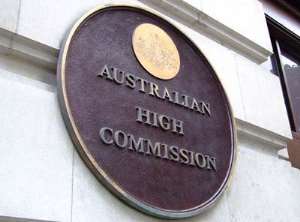
Accra, March 4, GNA - An Australian-funded scheme is saving and transforming lives in Akuapem North District, Eastern Region, and in Shai Osu Doku District and Ablekuma Sub-Metro in the Greater Accra Region.
A statement issued by the Australian High Commission in Accra and copied to the Ghana News Agency on Wednesday said, with funding from the Australian Government, WaterAid had provided more than 7,000 people access to safe and sustainable water, appropriate sanitation and safer hygiene practices.
'Supporting vulnerable communities in Ghana to access safe drinking water in a hygienic environment has been a lifeline, particularly for women and children', said Graeme Dickson, Acting Australian High Commissioner to Ghana.
He observed that, the success stories shared through the Australian funded project shows that communities were more able to drive their own development when they receive the appropriate tools, such as those provided through WaterAid.
Australia's support through WaterAid promotes an enabling environment for people from marginalised communities, particularly women, children and people with disability to have better access to water, sanitation and hygiene services and greater influence and engagement with decision-makers.
The statement said in Ablekuma Sub-Metro, Shai Osu Doku and Akuapem North Districts, the construction of rain water harvesting systems, iron removal plants, and water kiosks has increased access to safe and clean water for more than 6,000 people.
It said over 1,000 children have benefitted with access to sanitation through the provision of institutional latrines at selected schools.
It observed that the capacity of school children had also been strengthened through the school-based hygiene promotion activities, where school hygiene clubs are formed to provide peer learning among school children.
'Initially we found it very difficult to get to potable and reliable source of water. We had to walk for miles before getting water to bath, which often made us late for school and we were sometimes punished by teachers without them having the slightest idea of how we managed to get water to bath to school.
'But there was a relief when we got the borehole and a rain harvesting tank by which we are able to store rain water to supply the community as well,' said Beatrice Munyo, a pupil in Okyerekrom village. 'People have toilet in their homes now and good sanitation. We are now free from a lot of sicknesses'.
The statement said through the Endogenous Development (ED) approach, women from marginalised communities have also been empowered to identify and demand their rights as well as actively participate in development activities and contribute to community life.
It said the ED approach had led to the installation of a queen mother and a youth leader in a new intervention community, Tadankro.
It noted that the installation of a queen mother was very important because it demonstrates that women had the recognition of a community level institution that they control.
It said the increasing recognition of queen mothers and female chiefs suggest that women were gradually gaining the respect and power to influence policy changes and practices at the communities and districts.
It said the Australia Africa Community Engagement Scheme (AACES) is implemented in Ghana by WaterAid Ghana.
The AACES Annual Report is available at http://aid.dfat.gov.au. AACES is a partnership of the Australian Government, ten Australian Non-Governmental Organisations and their Africa-based partners.
The 90 million Australian dollar programme is funded by the Australian Government, through the Department of Foreign Affairs and Trade.
The programme focuses on marginalised communities, with particular attention to women, children, people with disability and people vulnerable to disaster.
It is being implemented in 11 African countries: Ghana, Ethiopia, Kenya, Malawi, Mozambique, Rwanda, South Africa, Tanzania, Uganda, Zambia and Zimbabwe.
GNA




 Former Kotoko Player George Asare elected SRC President at PUG Law Faculty
Former Kotoko Player George Asare elected SRC President at PUG Law Faculty
 2024 elections: Consider ‘dumsor’ when casting your votes; NPP deserves less — P...
2024 elections: Consider ‘dumsor’ when casting your votes; NPP deserves less — P...
 You have no grounds to call Mahama incompetent; you’ve failed — Prof. Marfo blas...
You have no grounds to call Mahama incompetent; you’ve failed — Prof. Marfo blas...
 2024 elections: NPP creates better policies for people like us; we’ll vote for B...
2024 elections: NPP creates better policies for people like us; we’ll vote for B...
 Don’t exchange your life for wealth; a sparkle of fire can be your end — Gender ...
Don’t exchange your life for wealth; a sparkle of fire can be your end — Gender ...
 Ghana’s newly installed Poland train reportedly involved in accident while on a ...
Ghana’s newly installed Poland train reportedly involved in accident while on a ...
 Chieftaincy disputes: Government imposes 4pm to 7am curfew on Sampa township
Chieftaincy disputes: Government imposes 4pm to 7am curfew on Sampa township
 Franklin Cudjoe fumes at unaccountable wasteful executive living large at the ex...
Franklin Cudjoe fumes at unaccountable wasteful executive living large at the ex...
 I'll 'stoop too low' for votes; I'm never moved by your propaganda — Oquaye Jnr ...
I'll 'stoop too low' for votes; I'm never moved by your propaganda — Oquaye Jnr ...
 Kumasi Thermal Plant commissioning: I pray God opens the eyes of leaders who don...
Kumasi Thermal Plant commissioning: I pray God opens the eyes of leaders who don...
